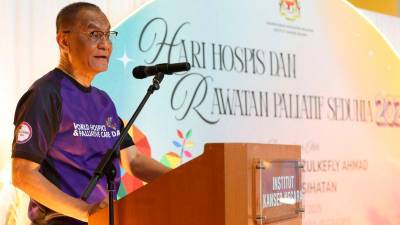PUTRAJAYA: Malaysia aims to increase the number of palliative care specialists to 50 in the next two years, up from the current 34, to meet the growing demand for end-of-life care, Health Minister Datuk Seri Dr Dzulkefly Ahmad said.
The move comes in response to the rising healthcare needs driven by the ageing population and the increasing demand for comprehensive palliative care services.
Dr Dzulkefly said that an estimated 180,000 Malaysians will require palliative care this year alone. However, Malaysia faces a shortage of specialists, with only 34 palliative care doctors currently available at Ministry of Health (MOH) hospitals, supported by experts from universities and the private sector.
“Although the number of specialists is limited, we ensure that each state has at least one expert to guarantee access to quality end-of-life care,“ he said during the World Hospice and Palliative Care Day 2025 celebration in Putrajaya here today.
To address the shortage of palliative care specialists, Dr Dzulkefly highlighted the importance of Domiciliary Care Services (PPD), a community-based programme offered at health clinics, along with collaboration with 27 non-governmental organisations (NGOs) under the Malaysian Hospice and Palliative Care Council (MHPCC) to provide ongoing support and ensure comprehensive care.
In addition, the ministry is implementing several strategic measures to enhance the country’s palliative care system, which include expanding the Special Interest Group (SIG) programme, which focuses on basic palliative care and end-of-life care, helping doctors without specialised expertise gain the necessary skills.
Training programmes, both in-person and online, are being conducted in collaboration with MHPCC to equip healthcare professionals with essential palliative care skills. Additionally, sub-specialisation programmes and advanced diplomas are being introduced to further enhance the capabilities of healthcare workers in this field.
Dr Dzulkefly also noted that palliative care modules are being integrated into public universities and private medical institutions, with the goal of ensuring all medical students receive basic training in this vital area of healthcare.
“We aim for every public university and private medical institution to incorporate these modules, so that future doctors are equipped with basic knowledge in palliative care, preparing them for an ageing society,“ he said.
Dr Dzulkefly also highlighted Malaysia’s improved standing in the global palliative care landscape. In 2015, the country ranked 38th in the Quality of Death and Dying Index. However, after the launch of the Atlas of Palliative Care 2025 in April, Malaysia’s ranking rose significantly, placing it in the second-highest tier for palliative care development. Malaysia now ranks 9th in the Asia-Pacific region and 41st globally out of 198 countries.
During the event, Dr Dzulkefly launched Malaysia’s first-ever “National Standards for Palliative Care” to enhance the quality of end-of-life care and standardise hospice services nationwide.
The new standards reflect the government’s commitment to ensuring that hospice services meet minimum quality benchmarks and provide consistent, compassionate care to patients.
“With this initiative, Malaysia is aligning itself with developed countries that recognise palliative care as a fundamental human right in health safety,“ Dr Dzulkefly added. – Bernama
